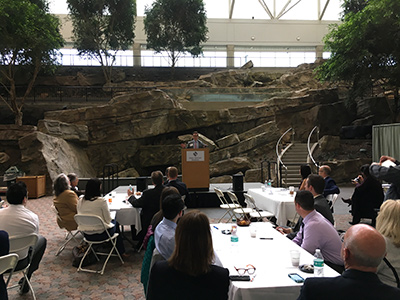WORCESTER – The challenges of spiraling health care and prescription drug costs and their potential solutions were addressed by special guest David Seltz, executive director of the state’s Health Policy Commission (HPC), during a chamber-sponsored summit on April 12.
Concerned with family health insurance premiums now among the highest rates in the country and outpacing wage increases, Seltz provided an overview of health care cost growth and cost containment efforts stemming from omnibus health care legislation that was passed in 2012.
Introducing Seltz, Timothy P. Murray, president and CEO of the Worcester Regional Chamber of Commerce, said an economic imperative exists for dealing with this issue, given the 110 community hospitals scattered across the state.
Speaking before chamber members gathered at Saint Vincent Hospital, Seltz advocated for the HPC’s three new innovation investment programs, which create an opportunity for Massachusetts providers, health plans, and their partners to receive funding to test and spread innovations that advance the Commonwealth’s cost containment goals while improving access to high-quality care.
“We’re worried about the wide variation of payments to hospitals for the same services that are not tied to quality outcomes,” said Seltz. “Prescription drug costs are still growing by 13 percent year after year, which demand the need for more transparency.”
One part of the challenge is that the state’s Health Care Law – now a national model in its 10th year – has become a zero sum game for many employers. Compounding the problem is the growing escalation in costs to fund the state’s Medicaid program serving the poor. Known in Massachusetts as MassHealth, that fund has grown exponentially in recent years, and when combined with other health reform spending amounted to $14.7 billion last year. Gov. Charles Baker’s proposed budget for the new fiscal year projects MassHealth spending at $15.47 billion.
In 2015, a MassHealth administrators budget analysis estimated that approximately 211,000 people were newly eligible for MassHealth: approximately 103,000 people moved from Commonwealth Care, 2,000 moved from the Medical Security Program, and 106,000 moved into coverage for the first time. Most of these people enrolled in MassHealth over the course of FY 2014, and 20,000 of the 211,000 enrolled during FY 2015. By the end of FY 2015, close to 1.7 million residents of Massachusetts received MassHealth coverage, up from an average of 1.5 million in FY 2014, an increase of just under 10 percent.
More costly health care providers in Boston and other eastern Massachusetts cities coupled with rising drug prices are two other contributing factors working against the goal of long-term health care reform viability, Seltz said.
A puzzling new norm is medical care’s shift to pricier Boston doctors and hospitals while lower prices are still offered by providers in other Massachusetts towns and cities such as Worcester. Controlling prescription drug spending in Massachusetts is another challenge altogether. Seltz cited spending for prescription drugs, which has risen 13 percent between 2013 and 2014.
Murray added that with the state’s health care finance policy a relative newcomer, “all of our efforts to bring spending under control will be required to humanely navigate an often complicated industry with better care, better health and lower costs.”






